Found a total of 10000 related content
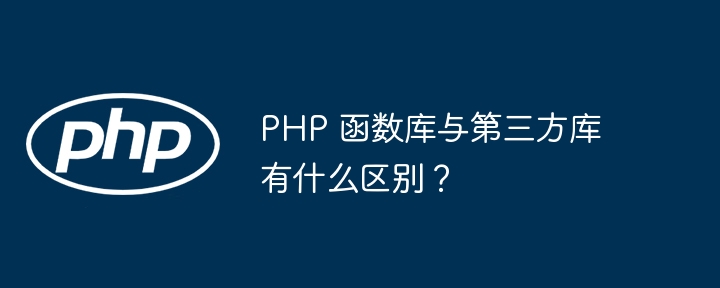
What is the difference between PHP function libraries and third-party libraries?
Article Introduction:The difference between PHP function libraries and third-party libraries is: Source: PHP function libraries are built-in functions, while third-party libraries are developed by the community. Maintenance: Function libraries are maintained by the PHP team, while third-party libraries are maintained by the community or individuals. Documentation: The function library provides official documentation, and the quality of documentation for third-party libraries varies from library to library. Reliability: The reliability of the function library is high, and the reliability of the third-party library depends on the library itself. Performance: The function library is optimized, the performance of third-party libraries depends on the implementation. Installation: The function library comes with PHP, and third-party libraries need to be installed using methods such as Composer.
2024-04-28
comment 0
891
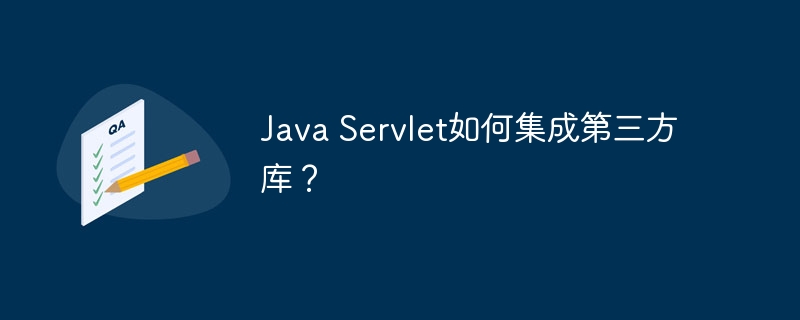
How does Java Servlet integrate third-party libraries?
Article Introduction:Integrating third-party libraries in JavaServlet requires the following steps: Add dependencies to the project, such as using Maven dependencies. Create a Servlet class and use the init() method to initialize the third-party library. Use third-party library methods in the Servlet class to process requests and responses.
2024-04-16
comment 0
1163
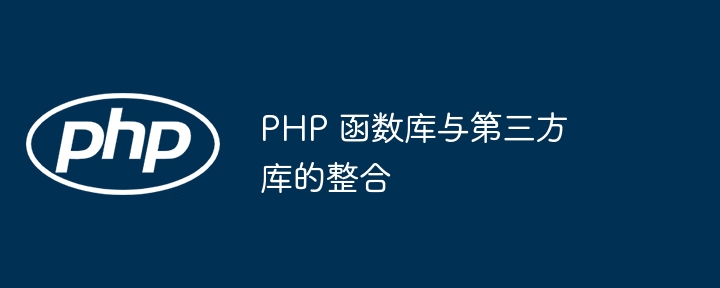
Integration of PHP function library and third-party library
Article Introduction:Function libraries and third-party libraries in PHP can extend the functionality of applications. The function library provides predefined functions that can be included through the include statement. Third-party libraries are available from sources such as Packagist, GitHub, and installed using Composer. Implement automatic loading of classes through autoloaders, such as automatic loading of the Guzzle library. Learn how to use the Dompdf third-party library to generate PDF files through practical cases, including loading the library, loading HTML content, and outputting PDF files. The integration of function libraries and third-party libraries greatly expands the functionality of PHP applications and improves development efficiency and project performance.
2024-04-22
comment 0
1105
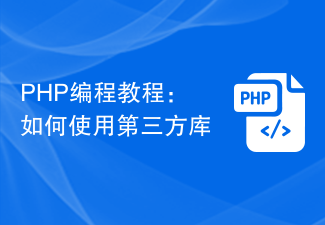
PHP Programming Tutorial: How to Use Third-Party Libraries
Article Introduction:PHP programming tutorial: How to use third-party libraries Introduction: In PHP program development, it is sometimes necessary to use third-party libraries to provide additional functions and tools. These libraries can greatly reduce the amount of code and improve development efficiency. This tutorial explains how to use third-party libraries and provides code examples. Understand the Types of Third-Party Libraries Third-party libraries are collections of code written and maintained by other developers. Common third-party libraries include database operation libraries, image processing libraries, form validation libraries, etc. These libraries are available through Composer, a package management tool for PHP
2023-08-26
comment 0
1355
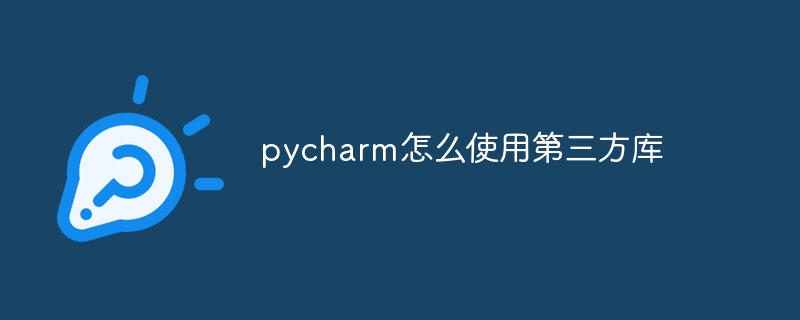
How to use third-party libraries in pycharm
Article Introduction:The steps for using third-party libraries in PyCharm include: installing the library through the pip command or PyCharm's Package Installer; importing the library; checking the library version; using library functions and classes; utilizing PyCharm's autocomplete function and help; from PyPI or conda-forge Find third-party libraries; create virtual environments and keep libraries updated to ensure your code is efficient and secure.
2024-04-18
comment 0
814
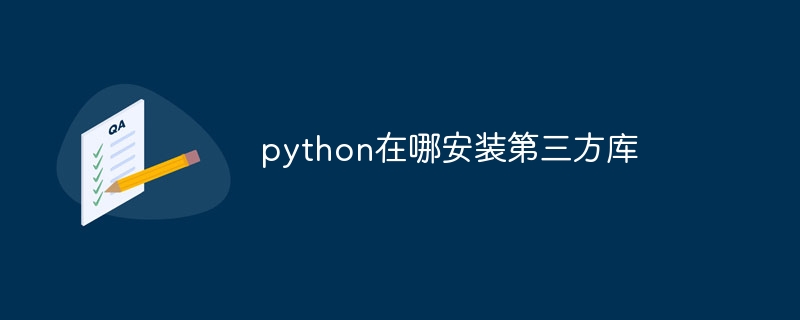
Where to install third-party libraries in python
Article Introduction:Python's third-party libraries are installed in the user directory (~/.local/lib/python3.x/site-packages) and the system directory (/usr/local/lib/python3.x/site-packages). Installation methods for third-party libraries include: using pip (Python's built-in package management tool) and conda (Anaconda distribution package management tool) from source code
2024-04-02
comment 0
1066

Does go language require third-party libraries?
Article Introduction:Go language requires third-party libraries. Although go language itself provides many powerful functions, sometimes developers need to use third-party libraries to complete specific tasks. Third-party libraries usually provide some functions that are not included in the go language standard library. , and has been more extensively tested and optimized to ensure its quality and performance. The use of third-party libraries can shorten development time, improve code reusability, and benefit from the experience and technology sharing of other developers.
2023-07-17
comment 0
924

How to import third-party libraries in pycharm
Article Introduction:To import third-party libraries into pycharm, you only need to install the library through pip and add it to the project dependencies, and then import it in the code. Detailed introduction: 1. Use pip to install the third-party library, enter the pip install command in the terminal window of PyCharm to install; 2. Add the library to the project dependencies, click on the project folder, select "File" -> "Settings", in In the settings dialog box, select "Project: your_project_name" and so on.
2023-12-08
comment 0
3644
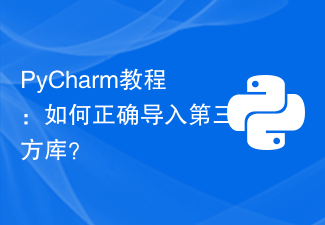
PyCharm Tutorial: How to correctly import third-party libraries?
Article Introduction:PyCharm is a powerful Python integrated development environment that provides a wealth of functions and tools to facilitate developers to write, debug and manage Python code. In actual development, we usually use third-party libraries to extend the functions of Python. So how to correctly import third-party libraries in PyCharm? This article will introduce you to it in detail and provide specific code examples. 1. Install third-party libraries Before importing third-party libraries into PyCharm, you first need to ensure that the corresponding libraries have been installed.
2024-02-23
comment 0
1217

How to use third-party libraries in Vue projects
Article Introduction:Vue is a popular JavaScript framework that provides a wealth of tools and features to help us build modern web applications. Although Vue itself already provides many practical functions, sometimes we may need to use third-party libraries to extend Vue's capabilities. This article will introduce how to use third-party libraries in Vue projects and provide specific code examples. 1. Introduce third-party libraries The first step to using third-party libraries in a Vue project is to introduce them. We can introduce it in the following ways
2023-10-15
comment 0
895
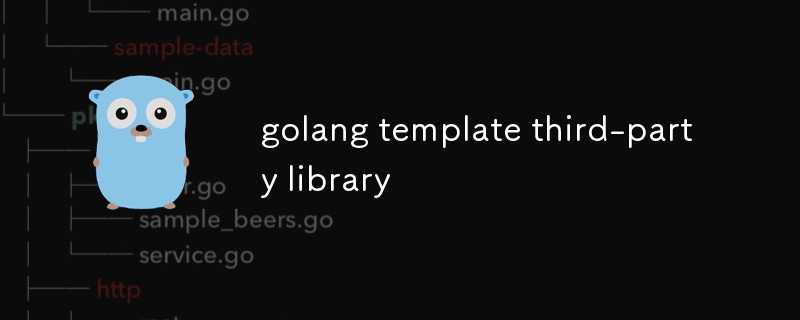
golang template third-party library
Article Introduction:This article discusses the use of third-party libraries for Golang templating. It outlines the advantages of using such libraries, including increased functionality, improved performance, better security, support for multiple template languages, and
2024-08-13
comment 0
475

How to use third-party libraries to simplify Java function development
Article Introduction:How to use third-party libraries to simplify Java function development Introduction: Java, as a widely used programming language, has rich functions and libraries. These libraries are valuable resources for developers and can help them develop applications more efficiently. Among them, third-party libraries refer to libraries written by third-party developers and available for developers to use. This article will introduce how to use third-party libraries to simplify the development of Java functions and illustrate it through code examples. 1. Understand the needs Before starting to use third-party libraries, you first need to understand your own development needs.
2023-08-05
comment 0
1165
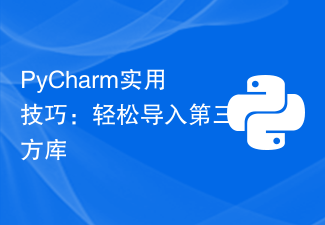
PyCharm practical tips: easily import third-party libraries
Article Introduction:PyCharm practical tips: Easily import third-party libraries As a powerful Python integrated development environment (IDE), PyCharm provides developers with many convenient functions and tools. Among them, importing third-party libraries is something that often needs to be dealt with in Python development. In PyCharm, using some tricks can make importing third-party libraries easier and more efficient. This article will introduce some practical tips and specific code examples to help developers better use PyCharm for third-party libraries.
2024-02-21
comment 0
831
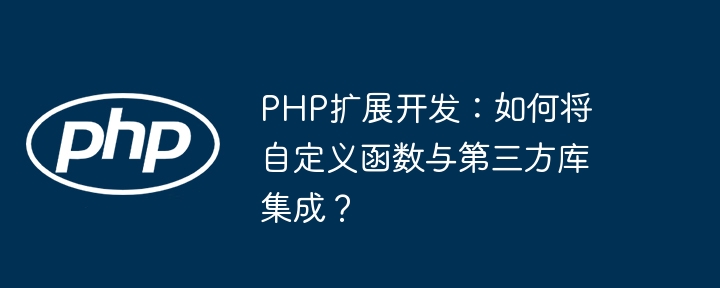
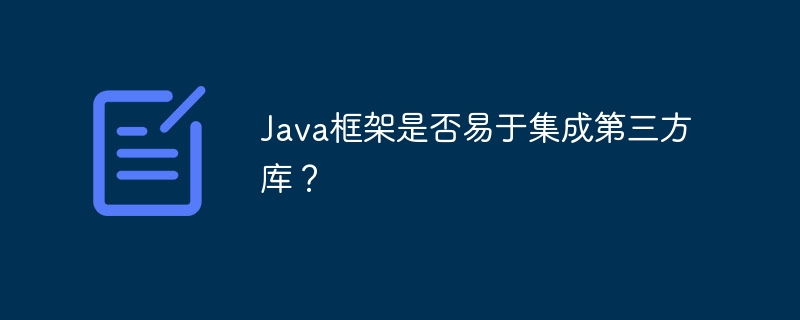
Is it easy to integrate third-party libraries with Java frameworks?
Article Introduction:The Java framework provides a mechanism to easily integrate third-party libraries. By importing third-party dependencies and using the dependency injection function provided by the framework, third-party libraries can be seamlessly integrated into Java applications, thereby extending functionality, reusing code, and Quality assurance.
2024-06-02
comment 0
306

How to deal with the use of third-party libraries in C# development
Article Introduction:How to deal with the use of third-party libraries in C# development Introduction: In C# development, using third-party libraries can improve development efficiency, broaden the scope of functions, and often avoid the embarrassment of reinventing the wheel. However, using third-party libraries will also bring some problems, such as version compatibility, incomplete documentation, etc. This article will introduce some common methods of dealing with third-party library usage issues and provide corresponding code examples. 1. Choose a suitable third-party library. Before using a third-party library, you first need to make a reasonable choice. The following are some reference standards: Goal 1
2023-10-09
comment 0
1305

How to integrate third-party libraries in Golang unit tests?
Article Introduction:Integrating third-party libraries in Golang unit tests can be achieved through dependency injection or using stubs: Dependency injection: using mocks or stubs instead of actual library implementations. Example: Use MockDependency to simulate a third-party library and inject it into the function under test. Stub: Provides access to the real library implementation. Example: Use stubFunc to stub an actual function in a third-party library and override its behavior.
2024-06-04
comment 0
866

How to use third-party libraries or plugins in Vue projects
Article Introduction:How to use third-party libraries or plug-ins in Vue projects. In Vue project development, we often use a variety of third-party libraries or plug-ins. These libraries or plug-ins can help us implement certain functions more conveniently or improve the project. development efficiency. This article will introduce in detail how to use third-party libraries or plug-ins in Vue projects and provide specific code examples. 1. Install third-party libraries or plug-ins through npm. In the Vue project, we use npm as a package management tool. Before using third-party libraries or plug-ins, we first need to install them through npm.
2023-10-09
comment 0
1552

How to integrate third-party libraries in Golang function testing
Article Introduction:When integrating third-party libraries in Go function testing, you need to use the TestMain function, t.Cleanup function or dependency injection. The TestMain function can be run before and after all tests to initialize and clean up third-party libraries. The t.Cleanup function runs after each test run and is used to clean up resources. Dependency injection passes third-party library instances into the function under test to facilitate control of the test environment.
2024-04-16
comment 0
983

How to install third-party libraries in sublime
Article Introduction:There are two ways to install third-party libraries in Sublime Text: Install using the Package Control package manager: Install Package Control. Search for and install the library in the command palette. Manual installation: Download the zip file of the library. Unzip the files into the user data directory. Restart Sublime Text.
2024-04-03
comment 0
863



















